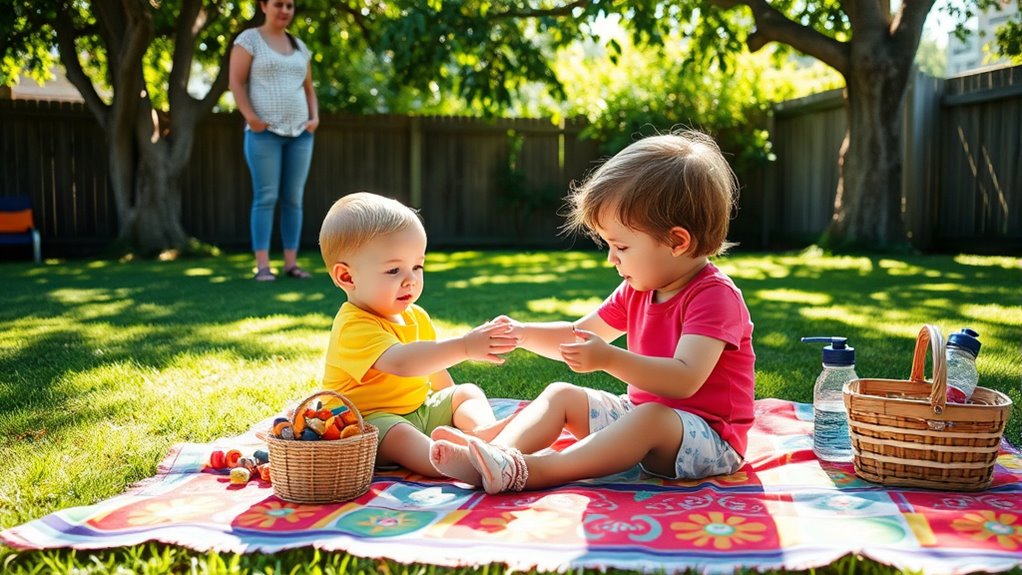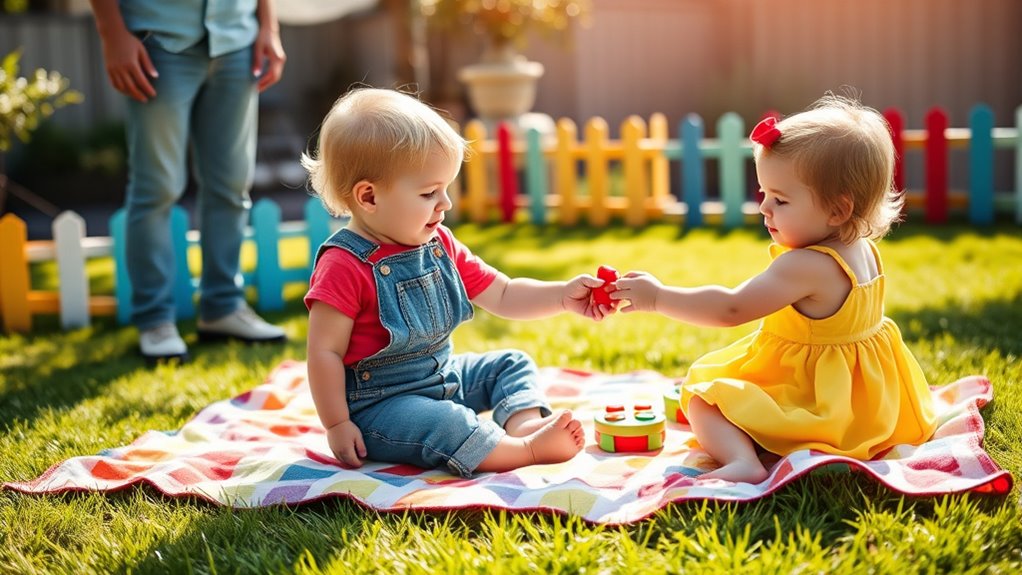When organizing a playdate for preschoolers, promote polite snack sharing, respect personal boundaries, and set clear rules to prevent conflicts. Supervise closely and teach children to ask permission before taking toys or joining activities. Create a cozy environment with quiet spaces and positive reinforcement for respectful behavior. Keeping an attentive attitude and addressing discomfort early helps guarantee safety and fun. If you keep exploring, you’ll discover even more ways to make playdates smooth and enjoyable for everyone.
Key Takeaways
- Teach children to politely share snacks and respect dietary restrictions during playdate meals.
- Encourage asking permission before taking toys or joining activities to respect personal boundaries.
- Supervise children closely to prevent choking, overstimulation, and ensure safe play.
- Promote polite interactions by modeling and reinforcing manners like “please” and “thank you.”
- Create a calming environment with quiet areas for breaks and address signs of discomfort promptly.

Hosting a playdate for preschoolers can be both fun and rewarding, but it also requires some attention to etiquette and safety. One of the first things to consider is how your child shares snacks during the visit. Encourage your child to offer snacks politely, but also teach them to respect others’ preferences and allergies. When preparing snacks, opt for healthy options and check with parents beforehand if there are any dietary restrictions. During the playdate, supervise snack time closely to prevent choking and guarantee everyone eats at a comfortable pace. Remind your child not to pressure friends into sharing or eating more than they want, fostering a sense of respect and understanding. This way, snack time remains a positive experience, and children learn about boundaries around food.
Respecting boundaries is essential for a smooth and enjoyable playdate. Teach your child to recognize and honor their friends’ personal space and comfort levels. If a child doesn’t want to share a toy or be hugged, respect their feelings without pushing them. Encourage your child to ask permission before taking a toy or joining in an activity, and remind them that it’s okay if someone wants to play alone or needs a break. As a host, observe how children interact and step in if you notice anyone feeling overwhelmed or uncomfortable. Setting clear, simple rules about boundaries helps children understand what’s acceptable and helps prevent conflicts. This also teaches them empathy and respect for others’ feelings, which are essential social skills. Additionally, understanding the importance of contrast ratio can help in creating a comfortable environment where lighting and visual clarity support focus during quieter activities.
Throughout the playdate, maintain a friendly yet attentive attitude. Keep an eye on the children’s interactions and intervene if needed, especially when boundaries are tested. Use positive reinforcement to encourage polite behavior, like saying “please” and “thank you,” and praise children when they respect each other’s space and choices. If disagreements arise, guide the children to resolve conflicts calmly and respectfully, emphasizing the importance of listening and understanding. Remember, children are still learning how to navigate social cues, so your gentle guidance helps them develop healthy habits. Additionally, having a few quiet activities on hand can give children a chance to take a break if they start feeling overwhelmed, helping everyone stay comfortable and happy.
Frequently Asked Questions
When Should Parents Stay During the Playdate?
You should stay during the entire playdate if your child is very young or if it’s their first time meeting new friends. According to supervision guidelines, your involvement guarantees safety and helps you observe interactions. As your child becomes more independent, you can gradually step back, but always remain nearby to intervene if needed. Your presence reassures your child and allows you to evaluate if the environment remains safe and fun.
How Do I Handle Disagreements Between Preschoolers?
Think of disagreements as storms in a teacup — quick to brew, quick to pass. When conflicts arise, gently guide your preschoolers to respect sharing boundaries and use simple conflict resolution skills. Encourage them to express feelings with words, listen to each other, and find common ground. Stay calm, act as a lighthouse, and remind them that teamwork helps weather any storm, turning disagreements into opportunities for growth.
What Should I Do if My Child Is Shy?
If your child is shy, focus on shyness management by creating a safe, encouraging environment. Gently introduce social activities that match their comfort level, and praise small successes to boost confidence building. Encourage slow interactions and avoid forcing them into situations they’re not ready for. Over time, your support helps your child feel more secure, fostering their social skills and reducing shyness in playdate settings.
Are Outdoor Playdates Safer Than Indoor Ones?
Are outdoor playdates safer than indoor ones? It depends on your supervision guidelines and outdoor safety measures. Outdoor play offers fresh air and physical activity, but hazards like uneven ground or nearby roads need vigilance. Keep a close eye, set clear boundaries, and guarantee safe equipment. With proper supervision, outdoor playdates can be just as safe as indoor ones—just stay alert, and enjoy the benefits of outdoor fun!
How Can I Encourage Sharing Among Preschoolers?
You can encourage sharing among preschoolers by using sharing tips like modeling positive behavior and praising them when they share. Encourage social skills by creating group activities that require cooperation, like building a tower or playing a game. Stay patient and gentle, reminding kids that sharing makes playtime more fun for everyone. Your consistent guidance helps them learn the value of sharing and develop strong social skills.
Conclusion
Remember, guiding your preschooler through playdate etiquette and safety is like planting a sturdy tree; with care and attention, it grows strong and resilient. I once watched a child confidently navigate a new play area, knowing their boundaries and safety rules—like a captain steering their ship. By setting clear expectations and modeling respect, you help your child develop trust and confidence. With your support, they’ll thrive in every playdate adventure, just like a well-tended garden blooms beautifully.










